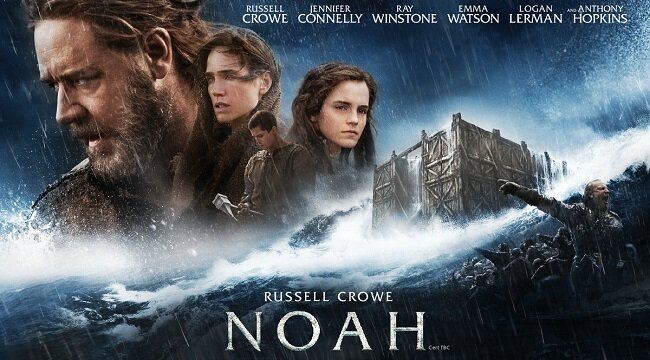Noah (2014)

Noah, directed by Darren Aronofsky and released in 2014, is a visually striking and thematically rich film that reimagines the biblical story of Noah’s Ark. Starring Russell Crowe as Noah, the film explores themes of faith, environmental stewardship, and human fallibility through a dramatic and symbolic retelling of the flood narrative from the Book of Genesis. Through its unique interpretation and modern sensibilities, Noah delves into profound questions about humanity’s relationship with nature and the divine.
One of the central themes of Noah is the concept of faith and divine purpose. The film portrays Noah as a man chosen by God to preserve life on Earth through a cataclysmic flood meant to cleanse the world of its corruption. Noah’s unwavering faith and his sense of duty to fulfill what he believes is a divine command drive the narrative. The film explores the struggle between personal belief and the overwhelming challenges faced in carrying out such a monumental task. Noah’s faith is tested by the enormity of his mission, and the film examines the complexities of adhering to a divine plan amidst personal doubts and moral dilemmas. This theme reflects broader questions about the nature of faith, the challenges of religious obedience, and the search for purpose in the face of adversity.

Another significant theme in Noah is environmental stewardship and the ethical treatment of nature. The film presents a vision of a world in which humanity’s abuse of the environment has led to its near destruction. Noah is depicted as a caretaker of the Earth, tasked with preserving the natural world from human greed and exploitation. The portrayal of the flood as a means of purging environmental degradation highlights the consequences of humanity’s disregard for nature. By emphasizing Noah’s role as a steward of creation, the film underscores the importance of environmental responsibility and the need to respect and protect the natural world. This theme resonates with contemporary concerns about environmental conservation and the impact of human actions on the planet.

The film also explores the theme of human fallibility and moral ambiguity. While Noah is depicted as a righteous man chosen by God, the film does not shy away from depicting his flaws and moral struggles. The internal conflict Noah faces, particularly in his interactions with his family and his ultimate decisions regarding the future of humanity, illustrates the complexity of human nature. The film portrays Noah’s actions as both heroic and morally ambiguous, reflecting the idea that even those with the best intentions can grapple with difficult choices and ethical dilemmas. This theme highlights the tension between idealism and reality, and the ways in which personal and moral conflicts shape human behavior.

The relationships within Noah’s family also play a crucial role in the film’s exploration of its themes. The dynamics between Noah, his wife Naameh (played by Jennifer Connelly), his sons Shem, Ham, and Japheth, and their respective partners, provide a lens through which the film examines family bonds, loyalty, and generational conflict. The strained relationships and differing viewpoints within the family reflect broader themes of unity and division, as well as the challenges of maintaining cohesion in the face of monumental tasks and moral uncertainties. The film uses these interpersonal conflicts to deepen its exploration of faith, responsibility, and human nature.

In conclusion, Noah is a thought-provoking film that explores themes of faith, environmental stewardship, human fallibility, and familial relationships. Through its dramatic retelling of the biblical flood story, the film invites viewers to reflect on the nature of divine purpose, the ethical treatment of the environment, and the complexities of human decision-making. By blending ancient narratives with contemporary concerns, Noah offers a rich and multifaceted exploration of the challenges and responsibilities inherent in the human condition.









